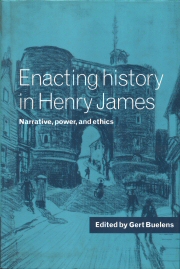Book contents
- Frontmatter
- Contents
- Notes on contributors
- Acknowledgments
- List of abbreviations
- Introduction
- 1 Power relations in the novels of James: the ‘liberal’ and the ‘radical’ version
- 2 Multiple germs, metaphorical systems, and moral fluctuation in The Ambassadors
- 3 James and the ethics of control: aspiring architects and their floating creatures
- 4 James and the shadow of the Roman Empire: manners and the consenting victim
- 5 ‘What Maisie knew’: Henry James's Bildungsroman of the artist as queer moralist
- 6 The double narrative of ‘The Beast in the Jungle’: ethical plot, ironical plot, and the play of power
- 7 Homoeroticism, identity, and agency in James's late tales
- 8 ‘A provision full of responsibilities’: senses of the past in Henry James's fourth phase
- 9 Possessing the American scene: race and vulgarity, seduction and judgment
- 10 History, narrative, and responsibility: speech acts in ‘The Aspern Papers’
- Index
1 - Power relations in the novels of James: the ‘liberal’ and the ‘radical’ version
Published online by Cambridge University Press: 02 February 2010
- Frontmatter
- Contents
- Notes on contributors
- Acknowledgments
- List of abbreviations
- Introduction
- 1 Power relations in the novels of James: the ‘liberal’ and the ‘radical’ version
- 2 Multiple germs, metaphorical systems, and moral fluctuation in The Ambassadors
- 3 James and the ethics of control: aspiring architects and their floating creatures
- 4 James and the shadow of the Roman Empire: manners and the consenting victim
- 5 ‘What Maisie knew’: Henry James's Bildungsroman of the artist as queer moralist
- 6 The double narrative of ‘The Beast in the Jungle’: ethical plot, ironical plot, and the play of power
- 7 Homoeroticism, identity, and agency in James's late tales
- 8 ‘A provision full of responsibilities’: senses of the past in Henry James's fourth phase
- 9 Possessing the American scene: race and vulgarity, seduction and judgment
- 10 History, narrative, and responsibility: speech acts in ‘The Aspern Papers’
- Index
Summary
In James-criticism, ‘demystifying the master’ seems to have become the main agenda. In spite of the fact that the work of James, as that of other major representatives of the established canon, has by now been repeatedly unmasked as being ‘compromised to the core’, revisionist critics keep coming back to James. The reason is not hard to find. Because James continues to be one of the culture heroes of liberal modernism, the authority and dominance of that cultural system can best be undermined by revealing James's limitations of awareness and his unwitting complicity with a social system which his work claims to distance or even transcend by art. If it can be shown that the master was not so masterful after all, but in the grasp of hidden anxieties about his lack of success in the market-place, his masculinity, or his class status, that he was, in other words, not in control, but himself ‘controlled’ by desire or certain discursive practices beyond his own comprehension, then the modernist myth of aesthetic transcendence could be exploded most effectively. The charge of an unwitting complicity with the system (of consumer capitalism, patriarchy, or society's disciplinary practices) ― in an extreme form, even the claim of a ‘criminal continuity’ between cultural practice and social regimes ― has become one of the main strategic moves of the new revisionism because it is ideally suited to undermining the liberal claim for a supreme oppositional potential of art.
- Type
- Chapter
- Information
- Enacting History in Henry JamesNarrative, Power, and Ethics, pp. 16 - 39Publisher: Cambridge University PressPrint publication year: 1997
- 2
- Cited by



